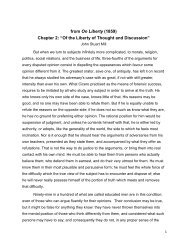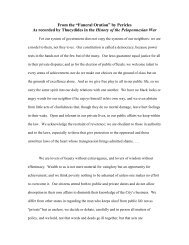Rousseau_contrat-social
Create successful ePaper yourself
Turn your PDF publications into a flip-book with our unique Google optimized e-Paper software.
BOOK IV<br />
1. THAT THE GENERAL WILL IS INDESTRUCTIBLE<br />
AS long as several men in assembly regard themselves as a single body,<br />
they have only a single will which is concerned with their common<br />
preservation and general well-being. In this case, all the springs of<br />
the State are vigorous and simple and its rules clear and luminous;<br />
there are no embroilments or conflicts of interests; the common good is<br />
everywhere clearly apparent, and only good sense is needed to perceive<br />
it. Peace, unity and equality are the enemies of political subtleties.<br />
Men who are upright and simple are difficult to deceive because of their<br />
simplicity; lures and ingenious pretexts fail to impose upon them, and<br />
they are not even subtle enough to be dupes. When, among the happiest<br />
people in the world, bands of peasants are seen regulating affairs of<br />
State under an oak, and always acting wisely, can we help scorning the<br />
ingenious methods of other nations, which make themselves illustrious<br />
and wretched with so much art and mystery?<br />
A State so governed needs very few laws; and, as it becomes necessary to<br />
issue new ones, the necessity is universally seen. The first man to<br />
propose them merely says what all have already felt, and there is no<br />
question of factions or intrigues or eloquence in order to secure the<br />
passage into law of what every one has already decided to do, as soon as<br />
he is sure that the rest will act with him.<br />
Theorists are led into error because, seeing only States that have been<br />
from the beginning wrongly constituted, they are struck by the<br />
impossibility of applying such a policy to them. They make great game of<br />
all the absurdities a clever rascal or an insinuating speaker might get<br />
the people of Paris or London to believe. They do not know that Cromwell<br />
would have been put to "the bells" by the people of Berne, and the Duc<br />
de Beaufort on the treadmill by the Genevese.<br />
But when the <strong>social</strong> bond begins to be relaxed and the State to grow<br />
weak, when particular interests begin to make themselves felt and the<br />
smaller societies to exercise an influence over the larger, the common<br />
81











